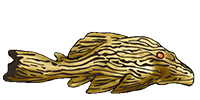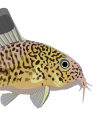| Scientific Name | Spectracanthicus zuanoni Chamon & Rapp Py-Daniel, 2014 |
| Common Names | L020, Acari Bola Branca Storplettet Sugemalle (Denmark) |
| Type Locality | Ilha do Sr. Izaltino, rio Xingu, Altamira, Pará, Brazil, 3°16'21"S, 52°12'07"W. |
| Etymology | Genus: Latin, spectrum = look, apparition + Greek, akantha = thorn. |
| Size | 129mm or 5.1" SL. Find near, nearer or same sized spp. |
| Identification | Spectracanthicus can be separated from all other loricariids except some Baryancistrus, Parancistrus and an undescribed Hemiancistrus by the presence of the dorsal-fin membrane contacting the adipose-fin spine. It can be separated from Baryancistrus and the Hemiancistrus by having fewer teeth (less than 25 vs. greater than 25) and from Parancistrus by having restricted gill openings. A key to the genus can be found here. L019 and L020 are problematic species in terms of identification. The original DATZ article shows an underwater picture (the fish is actually trying to hide in a shoe!!!) where you only could see the coloration of the fish. However, this coloration belongs to two different species found at the same place in the Xingú, a Baryancistrus species (L019) and an Spectracanthicus species. We don't know which genus the first L020 belonged to. To clarify this for the future, L019 is the Baryancistrus sp. and L020 the Oligancistrus sp. |
| Distribution | South America: Brazil: Rio Xingú at Altamira Amazon, Lower Amazon, Xingu (click on these areas to find other species found there) Login to view the map. |
| IUCN Red List Category | Not Evaluated |
| Temperature | 25.0-30.0°C or 77-86°F (Show species within this range) |
| Feeding | This species grazes on rocks, eating algae and other organisms in the periphyton. It typically feeds at night. User data. |
| Furniture | In nature, this species is a moderate reophilic species that is found in rock-bottom areas subjected to backwater and strong currents. Specimens were found individually or in groups of three, under shelter boulders (adults) and spaces beneath rocks (juveniles), up to 2m deep. |
| Suggested Tankmates | In nature, juvenile S. zuanoni are collected with Ancistrus sp., A. ranunculus, Baryancistrus xanthellus, Spectracanthicus punctatissimus, Hopliancistrus tricornis, Parancistrus nudiventris, Peckoltia vittata, and Pseudancistrus aff. barbatus. |
| Breeding | Unreported. |
| Breeding Reports | There are 4 breeding reports, read them all here. |
| Reference | Neotropical Ichthyology v. 12 (no. 1), pp 19, Figs. 14-15. |
| Registered Keepers | There are 35 registered keepers, view all "my cats" data. |
| Wishlists | Love this species? Click the heart to add it to your wish list. There are 7 wishes to keep this species, see who wants what. |
| Spotters | Spotted this species somewhere? Click the binoculars! There are 22 records of this fish being seen, view them all. |
| Forum BBCode | |
| Search for S. zuanoni | |
| Look up S. zuanoni on AquaticRepublic.com | |
 | Look up S. zuanoni on Fishbase |
 | Look up S. zuanoni on Encyclopedia of Life |
 | Look up S. zuanoni on Global Biodiversity Information Facility |
| LFS label creator ARN ref:1.4.88.187 | |
| Last Update | 2025 Jan 02 01:37 (species record created: 2001 May 05 00:00) |





/siluriformes/loricariidae/spectracanthicus/zuanoni/1.jpg)
/siluriformes/loricariidae/spectracanthicus/zuanoni/2.jpg)
/siluriformes/loricariidae/spectracanthicus/zuanoni/3.jpg)
/siluriformes/loricariidae/spectracanthicus/zuanoni/4.jpg)
/siluriformes/loricariidae/spectracanthicus/zuanoni/5.jpg)
/siluriformes/loricariidae/spectracanthicus/zuanoni/6.jpg)
/siluriformes/loricariidae/spectracanthicus/zuanoni/7.jpg)
/siluriformes/loricariidae/spectracanthicus/zuanoni/8.jpg)
/siluriformes/loricariidae/spectracanthicus/zuanoni/9.jpg)
/siluriformes/loricariidae/spectracanthicus/zuanoni/10.jpg)
/siluriformes/loricariidae/spectracanthicus/zuanoni/11.jpg)
/siluriformes/loricariidae/spectracanthicus/zuanoni/12.jpg)
/siluriformes/loricariidae/spectracanthicus/zuanoni/13.jpg)
/siluriformes/loricariidae/spectracanthicus/zuanoni/14.jpg)
/siluriformes/loricariidae/spectracanthicus/zuanoni/15.jpg)
/siluriformes/loricariidae/spectracanthicus/zuanoni/16.jpg)
/siluriformes/loricariidae/spectracanthicus/zuanoni/17.jpg)
/siluriformes/loricariidae/spectracanthicus/zuanoni/18.jpg)
/siluriformes/loricariidae/spectracanthicus/zuanoni/19.jpg)